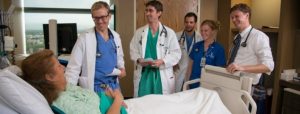What happens I am admitted to hospital?
This article describes the average unplanned (emergency) A&E or planned (elective) admission (e.g. for an operation). The average length of stay is 6-7 days.
This page is an alphabetical list of things that happen when you are admitted to hospital for that period. No one likes being in hospital but there are things you can do to make it more tolerable.
Within this list, there are also some top tips on how to:
- Get more out of your stay
- Get out quicker
- Improve your aftercare.
Ok. So, tell me more about what happens I am admitted to hospital?
Allergies
If you have any allergies, please let staff know.
Allied health professionals
As well as doctors and nurses you may be seen by:
- Physiotherapists
- Occupational therapists
- Dietitians
- Speech and language therapists
- Physician associates (PAs) and advanced clinical practitioners (ACPs) – have roles like a middle grade doctor.
Arrival – what you need to bring
This is what we would recommend you bring:
- 2 sets of nightwear and several items of underwear
- Some day wear as well. This is now encouraged and helps patients recover more quickly
- Slippers
- Glasses or contact lenses
- Toothbrush, toothpaste, soap
- Sanitary towels (for women)
- Shaving things (for men)
- Sleep mask and ear plugs
- Books or magazines to read
- Your medication and an up-to-date list of them
- Anything else you might need like hearing aids or a wheelchair
- A mobile phone and charger.
Please do not bring
- Lots of money
- Things you do not want to lose
- Alcohol
- TV or radio
- Big suitcases.
Bedside equipment
- A call bell
- A light, TV, radio and phone near to your bed
- Ask the nurse how to use them
- You may have to pay for some of these (e.g. TV).
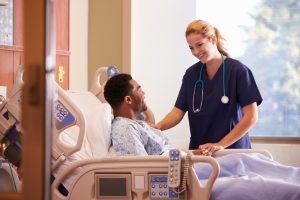 Doctor talking to a patient
Doctor talking to a patient
Carers
- If you have a carer at home and you want them to care for you in hospital, please speak to a member of staff
- Family members may be shown how to provide care.
Closing wards
If there is an outbreak of infection, some wards might be closed. This is to protect patients, staff and visitors.
Consent to treatment
For operations – and some procedures and investigations – you will be asked to sign a consent form. It is up to you whether you give your consent for it.
You should ask as much about the pros and cons of treatment as possible, before giving your consent – so you can make an informed decision. What are the alternatives? What happens if we do nothing and watch? Etc
Discharge (going home from hospital)
Most patients get better quicker when they are at home. Here are some points:
- You and your relatives/carers will be told about going home before the day of discharge
- If you feel worried about this, please speak to a member of staff
- There are people at the hospital who can help you with your home arrangements, e.g. social workers. Ask to see them
- You will be given any medicines to take home with you. Don’t leave without it
- If you need to come back to the hospital to be seen in outpatients, you will be given an outpatient appointment. Ditto
- If you cannot use public transport, or get a relative to pick you up, we may be able to get you free transport home
- It helps us (best use of beds) if you can go home in the morning before lunch, Please try.
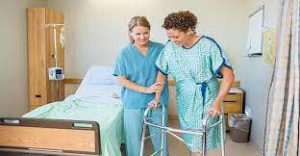
Judging the time to leave is a skill. Too early and you may come back. Too late and you may acquire new problems (e.g. infections). Earlier is generally better. Ask every day why you need to stay in hospital and which day you are going home.
Doctors
There are three levels of seniority:
- Junior doctors – in first 4 years of training
- Registrars – middle of training to be a consultant (years 5-10 after qualification)
- Consultants – lead medical teams (11 years+). It is important you know they name. It may not be obvious.
Junior doctors and registrars make decisions and carry out treatment on behalf of consultants. But all their work is supervised by a named consultant. Ask for the name, phone number and email address of the consultant’s secretary.
Feel free to ask any doctor their name, seniority and what type of doctor they are. Write it down.
Eating and Drinking
- Please ask if you need help with your food or drink.
- Before any operation, you may only be able to eat and drink certain things
- You will get 3 meals a day. If you miss a meal, ask for a snack box
- If you have a special diet, please let a member of staff know
- Visitors are now encouraged at mealtimes if patients require assistance with feeding.
Fire
- If you hear the fire alarm, please do what the staff tell you
- If you find a fire, tell a member of staff
- Do not try and put out the fire yourself.
Hospital services
- There are many accessible toilets, and some baby changing areas
- There is a shop, postbox and cash machine.
How long will you be in hospital for?
The average length of stay is 6-7 days. It may be one night (some operations) or many weeks.
Infection (stopping)
- Hand washing is very important to stop infection
- Many areas have hand gel at the entrance – please use this
- If you have an infection or diarrhoea, please do not come to the hospital.
Learn to concentrate
- Being ill is mentally tiring and there is a lot going on, on wards
- So, its OK not to speak or read or do things. Be quiet, concentrate and focus on getting better
- Ask visitors to respect that need, and take stresses off you – e.g they can make all discharge arrangements, and details of follow-up.
Medicines
- Please bring with you any medicine, tablets or inhalers that you are taking
- Please show them to the staff when you arrive on the ward.
Notebook
There is a lot of noise and things happening in a hospital. That can make it ‘all of a whirl’ or even be frightening. So keep a notebook (or on your phone) and record:
- Day/date
- Decisions made on ward rounds
- Who has visited you. If they are a doctor, what is their name, seniority, what type of doctor they are, and how you contact them if your need to
- Diagnosis (an any alternative ones being considered)
- Current treatment plan
- When you are going home, and what you can do to make sure that happens.
Operations and procedures
Operations and procedures are mainly 9am-5pm.
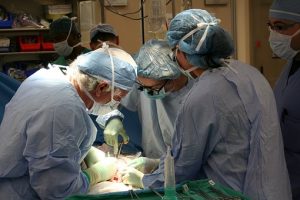
Do not worry if you have to go to the operating theatre. You are in safe hands
Pain
We can give you treatment so you are not in too much pain. If you are in pain, please tell a member of staff.
Pharmacist – before discharge
If your tablets confuse you (especially new ones) ask to speak to a pharmacist. They can also speak to your local pharmacist and arrange a dosette box.
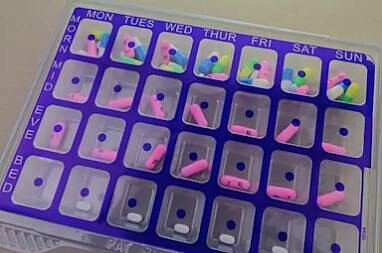 Dosette box
Dosette box
Reception desks
The main hospital reception desk is at the main entrance. At all outpatient areas you will find a reception desk there, with a member of staff to help you. All questions are good questions.
Rehabilitation
This is available if the physios and OTs feel it necessary. Ask if you think you need some before you go home.
Room – will I have my own one?
It depends. Most patients are in a bay of 6, 4 or 2 patients (same sex). Depending on the age of the hospital, there is a variable number of single rooms. It is not normally possible to request a single room, as they arent that many and they are used for patients with complex problems, including infections.
Second opinion
If you are not happy with decisions made by your consultant or one of his/her team, ask to speak to the ward manager, modern matron or manager. They will get another consultant to review you. Doctors do not mind second opinions. Actually they quite like them, as if another doctor has the same view, it reassures them. If they do not, they are keen to learn and improve.
Smoking
Smoking is not allowed inside or outside the hospital.
Staff, safety and what to do if have concerns
- It is very important that you feel safe when you are in hospital
- So all staff will have a badge with their picture, name and job title
- If you feel worried about anything, or you think you have been treated unfairly, please speak to a senior member of staff – we suggest the ward manager, modern matron, or manager of the department the doctors and nurses work in
- If things are still not right, ask to speak to a PALS person. They are situated near the entrance of a hospital
- While you are in hospital, you will wear a bracelet that says who you are. Check you are always wearing it. This will make sure you get the right treatment.
Special needs
- If you do have any special needs, staff may make a care plan for you
- This will let other staff know your needs.
Staying mobile (and preventing blood clots)
- Staying mobile in hospital can help you recover more quickly
- Being immobile can lead to additional health problems, such as infections and pressure sores. It also increases your risk of blood clots in the legs or lungs (venous thrombo-embolism, VTE)
- To avoid VTE, you will be encouraged to move about the ward regularly. You will be given as much assistance as you need to move about
- If you are at increased risk of VTE, you may be given daily blood thinning injections and/or compression stockings to improve your circulation.
Structure of day – what happens when
- 7am. Wake up and be greeted by night staff, going off shift, and breakfast
- Medication round (given tablets) and blood tests
- 9am-12pm. Ward round (doctors)
- 12pm Lunch
- Medication round
- 2pm. Visitors allowed (2pm+; but check on that ward)
- 6pm. Supper
- Medication round
- 10pm. Lights out.
The exact times of these vary from ward to ward, and hospital to hospital.
Students
- There may be students at the hospital who might want to talk to you. Sometimes they may be at your outpatient appointments
- We need to teach the next generation of health professionals
- If you do not want a student to be in the room, tell a member of staff.
Translation into other languages
- Hospitals have a translation service
- If you need help to understand things, please let us know.
Trolley visiting
A trolley visits the ward, selling snacks, toiletries and magazines. Or if you are able, you can go to the hospital shop.
Visiting
Please visit. It is good for the morale of your loved one, and gets you involved in the diagnosis, treatment and discharge plan. More frequent short visits (under an hour) are better than fewer long ones. Patients need to concentrate to get better.
If you are visiting, please:
- Do not touch the patient’s wounds or equipment
- Do not bring flowers
- Do not use mobile phones in the ward or take photographs in hospital
- Visitors should not sit on the bed
- Children are not usually allowed to visit
- People should not visit if they are unwell, have an infection or diarrhoea
- Visitors should not use the patient toilets
- Only 2 visitors are allowed at a time
- Check the visiting hours of the ward before you go, via the hospital website, or ringing the ward. They will vary
- All visitors should use the hand gel when the arrive and leave
- Sometimes a family member can stay overnight
- Guide dogs are allowed if there is nobody else to look after the dog.
If you are getting too many visitors or they are staying too long, speak to the nurses.
Ward clerks and secretaries
It is important to get to know:
- Ward clerk – they are very nice and helpful, and can explain things, and help you get home
- Consultant’s secretary – ask the name of your consultant and their secretaries phone number and email address. You may need it after discharge.
Ward rounds
The doctors do ward rounds in the morning. This is why we do not allow visitors then. Please be by your bed.
Work and sick (fit) Notes
If you have a job and you are away from work for less than 7 days, you do not need a sick note
Summary
We have described what happens I am admitted to hospital. We hope you understand hospital admission better now.
“We are very sorry hospitals are not working as well as they should at present. We will improve” [MyHSN Ed]
This article was reviewed by Sister Alison Kavanagh RN, Clinical Education Lead for Renal Services, UHCW


